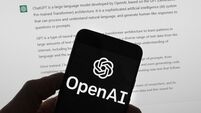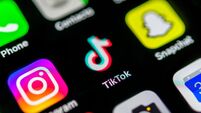Sarah Harte: Why are we letting the richest men in the world steal our ideas?

Mark Zuckerberg at the 11th Breakthrough Prize Ceremony recently in Los Angeles. There is something disgusting about super-wealthy tech companies using writers' work for free, piggybacking on their creativity, skill, and graft to train generative AI models and algorithms without their consent. Photo: Jordan Strauss/Invision/AP
AI activates my gag reflex, firmly putting me in the Luddite category. No getting down with the cool kids for me. Try using Google, and an answer from AI pops up. Since the time of the printing press, gatekeepers have curated what content we see, but wow, talk about a ratcheting up of content domination.
It’s not the creeping fear of my AI replacement as a writer or the threat to my line of work that fuels my sceptical feelings about AI. I object to our collective consciousness being unthinkingly infiltrated by monetised parasitical digital networks. There’s probably no putting the genie back in the lamp, but there is a case for being more mindful about AI.















